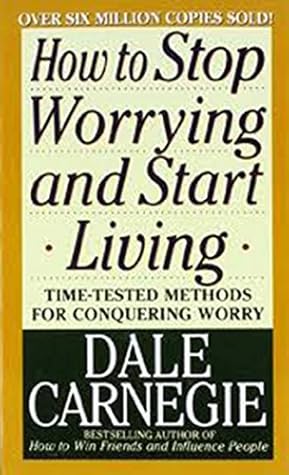More on this book
Community
Kindle Notes & Highlights
you won’t find anything new in it, but you will find much that is not generally applied.
Our trouble is not ignorance, but inaction.
The rapidity with which we forget is astonishing.
Bernard Shaw once remarked: “If you teach a man anything, he will never learn.”
Don’t do the natural thing, the impulsive thing. That is usually wrong.
Live in “Day-tight Compartments”
lead a life free from worry: “Our main business is not to see what lies dimly at a distance, but to do what lies clearly at hand.”
The day of man’s salvation is now.
the best possible way to prepare for tomorrow is to concentrate with all your intelligence, all your enthusiasm, on doing today’s work superbly today. That is the only possible way you can prepare for the future.
begin the day with Christ’s prayer “Give us this day our daily bread.”
No, this prayer teaches us to ask for today’s bread only. Today’s bread is the only kind of bread you can possibly eat.
“Have no anxiety for the tomorrow.”
the chief difference between good thinking and bad thinking is this: good thinking deals with causes and effects and leads to logical, constructive planning; bad thinking frequently leads to tension and nervous breakdowns.
church hymn: One step enough for me.
“Step I. I analyzed the situation fearlessly and honestly and figured out what was the worst that could possibly happen as a result of this failure.
“Step II. After figuring out what was the worst that could possibly happen, I reconciled myself to accepting it, if necessary.
“Step III. From that time on, I calmly devoted my time and energy to trying to improve upon the worst which I had already accepted mentally.
Be willing to have it so,” he said, because “… acceptance of what has happened is the first step in overcoming the consequences of any misfortune.”
Ask yourself, “What is the worst that can possibly happen?” Prepare to accept it if you have to. Then calmly proceed to improve on the worst.
Fear, worry, hate, supreme selfishness, and the inability to adjust themselves to the world of reality—these
One out of every six of our young men called up by the draft in the Second World War was rejected for psychiatric reasons.
Another illuminating book about worry is Man Against Himself by Dr. Karl Menninger, one of the “Mayo brothers of psychiatry.” Dr. Menninger’s book will not give you any rules about how to avoid worry; but it will give you a startling revelation of how we destroy our bodies and minds by anxiety, frustration, hatred, resentment, rebellion, and fear.
“Half the worry in the world is caused by people trying to make decisions before they have sufficient knowledge on which to base a decision.
Let me repeat that: “If a man will devote his time to securing facts in an impartial, objective way, his worries will usually evaporate in the light of knowledge.”


